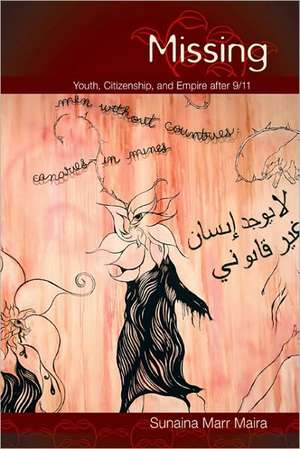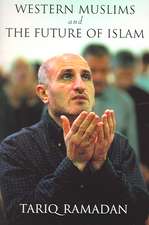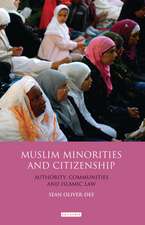Missing – Youth, Citizenship, and Empire after 9/11
Autor Sunaina Marr Mairaen Limba Engleză Paperback – 30 apr 2009
Preț: 301.20 lei
Nou
Puncte Express: 452
Preț estimativ în valută:
57.64€ • 60.33$ • 47.97£
57.64€ • 60.33$ • 47.97£
Carte tipărită la comandă
Livrare economică 31 martie-14 aprilie
Preluare comenzi: 021 569.72.76
Specificații
ISBN-13: 9780822344094
ISBN-10: 0822344092
Pagini: 352
Dimensiuni: 156 x 234 x 24 mm
Greutate: 0.5 kg
Editura: MD – Duke University Press
ISBN-10: 0822344092
Pagini: 352
Dimensiuni: 156 x 234 x 24 mm
Greutate: 0.5 kg
Editura: MD – Duke University Press
Recenzii
"This timely, illuminating, and politically engaged book looks at the lives of young South Asian immigrants in the United States ten years after the attacks in New York and Washington.... Since 9/11, much analysis of young people and their place in the new world order has focused on culture and identity. This book addresses this balance, showing clearly how the events of 9/11 cannot be understood without being placed in their historical context and without being linked to other forms of American imperialism and displays of power. In this it succeeds admirably and uses this small group of young people in New Jersey to draw profound conclusions about identity, citizenship, and transnationalism." - Heather Montgomery, Journal of the Royal Anthropological Institute
Sunaina Marr Maira has authored one of the most important books of our time. Missing is a carefully researched and beautifully written account of the experiences, ideas, and opinions of South Asian Muslim immigrant children in the United States who find themselves deemed enemies of the state through no fault of their own in the aftermath of 9/11. Through a deft blend of ethnography and cultural critique, Maira demonstrates how the expanding reach and power of the nation-state overseas leads to new forms of disciplinary control at home: in schools, workplaces, media imagery, and immigration law. - George Lipsitz, author of Footsteps in the Dark: The Hidden Histories of Popular Music
How is national belonging experienced by South Asian teenagers in post-9/11 America? In a deeply thoughtful and compassionate ethnography, Sunaina Marr Maira explores this question, providing one of the most compelling analyses of citizenship in contemporary America. She introduces us to young people who worry about deportation, racism, and the challenges of schooling in another language, but who also possess an acute analysis of imperialism and are capable of forging a transnational community united as much by Bollywood as by their sudden elevation to Public Enemy Number 1. Mairas stunning achievement is to give vivid content to state power, providing an up close and personal look at how it is lived and resisted by those whom we relentlessly evict from political community. - Sherene H. Razack, author of Casting Out: The Eviction of Muslims from Western Law and Politics
"This timely, illuminating, and politically engaged book looks at the lives of young South Asian immigrants in the United States ten years after the attacks in New York and Washington... Since 9/11, much analysis of young people and their place in the new world order has focused on culture and identity. This book addresses this balance, showing clearly how the events of 9/11 cannot be understood without being placed in their historical context and without being linked to other forms of American imperialism and displays of power. In this it succeeds admirably and uses this small group of young people in New Jersey to draw profound conclusions about identity, citizenship, and transnationalism." - Heather Montgomery, Journal of the Royal Anthropological Institute "Sunaina Marr Maira has authored one of the most important books of our time. Missing is a carefully researched and beautifully written account of the experiences, ideas, and opinions of South Asian Muslim immigrant children in the United States who find themselves deemed enemies of the state through no fault of their own in the aftermath of 9/11. Through a deft blend of ethnography and cultural critique, Maira demonstrates how the expanding reach and power of the nation-state overseas leads to new forms of disciplinary control at home: in schools, workplaces, media imagery, and immigration law." - George Lipsitz, author of Footsteps in the Dark: The Hidden Histories of Popular Music "How is national belonging experienced by South Asian teenagers in post-9/11 America? In a deeply thoughtful and compassionate ethnography, Sunaina Marr Maira explores this question, providing one of the most compelling analyses of citizenship in contemporary America. She introduces us to young people who worry about deportation, racism, and the challenges of schooling in another language, but who also possess an acute analysis of imperialism and are capable of forging a transnational community united as much by Bollywood as by their sudden elevation to Public Enemy Number 1. Maira's stunning achievement is to give vivid content to state power, providing an up close and personal look at how it is lived and resisted by those whom we relentlessly evict from political community." - Sherene H. Razack, author of Casting Out: The Eviction of Muslims from Western Law and Politics
Sunaina Marr Maira has authored one of the most important books of our time. Missing is a carefully researched and beautifully written account of the experiences, ideas, and opinions of South Asian Muslim immigrant children in the United States who find themselves deemed enemies of the state through no fault of their own in the aftermath of 9/11. Through a deft blend of ethnography and cultural critique, Maira demonstrates how the expanding reach and power of the nation-state overseas leads to new forms of disciplinary control at home: in schools, workplaces, media imagery, and immigration law. - George Lipsitz, author of Footsteps in the Dark: The Hidden Histories of Popular Music
How is national belonging experienced by South Asian teenagers in post-9/11 America? In a deeply thoughtful and compassionate ethnography, Sunaina Marr Maira explores this question, providing one of the most compelling analyses of citizenship in contemporary America. She introduces us to young people who worry about deportation, racism, and the challenges of schooling in another language, but who also possess an acute analysis of imperialism and are capable of forging a transnational community united as much by Bollywood as by their sudden elevation to Public Enemy Number 1. Mairas stunning achievement is to give vivid content to state power, providing an up close and personal look at how it is lived and resisted by those whom we relentlessly evict from political community. - Sherene H. Razack, author of Casting Out: The Eviction of Muslims from Western Law and Politics
"This timely, illuminating, and politically engaged book looks at the lives of young South Asian immigrants in the United States ten years after the attacks in New York and Washington... Since 9/11, much analysis of young people and their place in the new world order has focused on culture and identity. This book addresses this balance, showing clearly how the events of 9/11 cannot be understood without being placed in their historical context and without being linked to other forms of American imperialism and displays of power. In this it succeeds admirably and uses this small group of young people in New Jersey to draw profound conclusions about identity, citizenship, and transnationalism." - Heather Montgomery, Journal of the Royal Anthropological Institute "Sunaina Marr Maira has authored one of the most important books of our time. Missing is a carefully researched and beautifully written account of the experiences, ideas, and opinions of South Asian Muslim immigrant children in the United States who find themselves deemed enemies of the state through no fault of their own in the aftermath of 9/11. Through a deft blend of ethnography and cultural critique, Maira demonstrates how the expanding reach and power of the nation-state overseas leads to new forms of disciplinary control at home: in schools, workplaces, media imagery, and immigration law." - George Lipsitz, author of Footsteps in the Dark: The Hidden Histories of Popular Music "How is national belonging experienced by South Asian teenagers in post-9/11 America? In a deeply thoughtful and compassionate ethnography, Sunaina Marr Maira explores this question, providing one of the most compelling analyses of citizenship in contemporary America. She introduces us to young people who worry about deportation, racism, and the challenges of schooling in another language, but who also possess an acute analysis of imperialism and are capable of forging a transnational community united as much by Bollywood as by their sudden elevation to Public Enemy Number 1. Maira's stunning achievement is to give vivid content to state power, providing an up close and personal look at how it is lived and resisted by those whom we relentlessly evict from political community." - Sherene H. Razack, author of Casting Out: The Eviction of Muslims from Western Law and Politics
Notă biografică
Sunaina Marr Maira
Textul de pe ultima copertă
"How is national belonging experienced by South Asian teenagers in post-9/11 America? In a deeply thoughtful and compassionate ethnography, Sunaina Marr Maira explores this question, providing one of the most compelling analyses of citizenship in contemporary America. She introduces us to young people who worry about deportation, racism, and the challenges of schooling in another language, but who also possess an acute analysis of imperialism and are capable of forging a transnational community united as much by Bollywood as by their sudden elevation to Public Enemy Number 1. Maira's stunning achievement is to give vivid content to state power, providing an up close and personal look at how it is lived and resisted by those whom we relentless evict from political community."--Sherene H. Razack, author of "Casting Out: The Eviction of Muslims from Western Law and Politics"
Cuprins
Acknowledgments ix
Introduction. South Asian Muslim Youth in the United States after 9/11 1
1. Imperial Feelings: U.S. Empire and the War on Terror 37
2. Cultural Citizenship 76
3. Transnational Citizenship: Flexibility and Control 95
4. Economies of Citizenship: Work, Play, and Polyculturalism 128
5. Dissenting Citizenship: Orientalisms, Feminisms, and Dissenting Feelings 190
6. Missing: Fear, Complicity, and Solidarity 258
Appendix. A Note on Methods 291
Notes 293
Bibliography 305
Index 329
Introduction. South Asian Muslim Youth in the United States after 9/11 1
1. Imperial Feelings: U.S. Empire and the War on Terror 37
2. Cultural Citizenship 76
3. Transnational Citizenship: Flexibility and Control 95
4. Economies of Citizenship: Work, Play, and Polyculturalism 128
5. Dissenting Citizenship: Orientalisms, Feminisms, and Dissenting Feelings 190
6. Missing: Fear, Complicity, and Solidarity 258
Appendix. A Note on Methods 291
Notes 293
Bibliography 305
Index 329
Descriere
An ethnographic exploration of how young South Asian Muslim immigrants living in the United States experienced and understood national belonging (or exclusion) in the years immediately following September 11 2001














